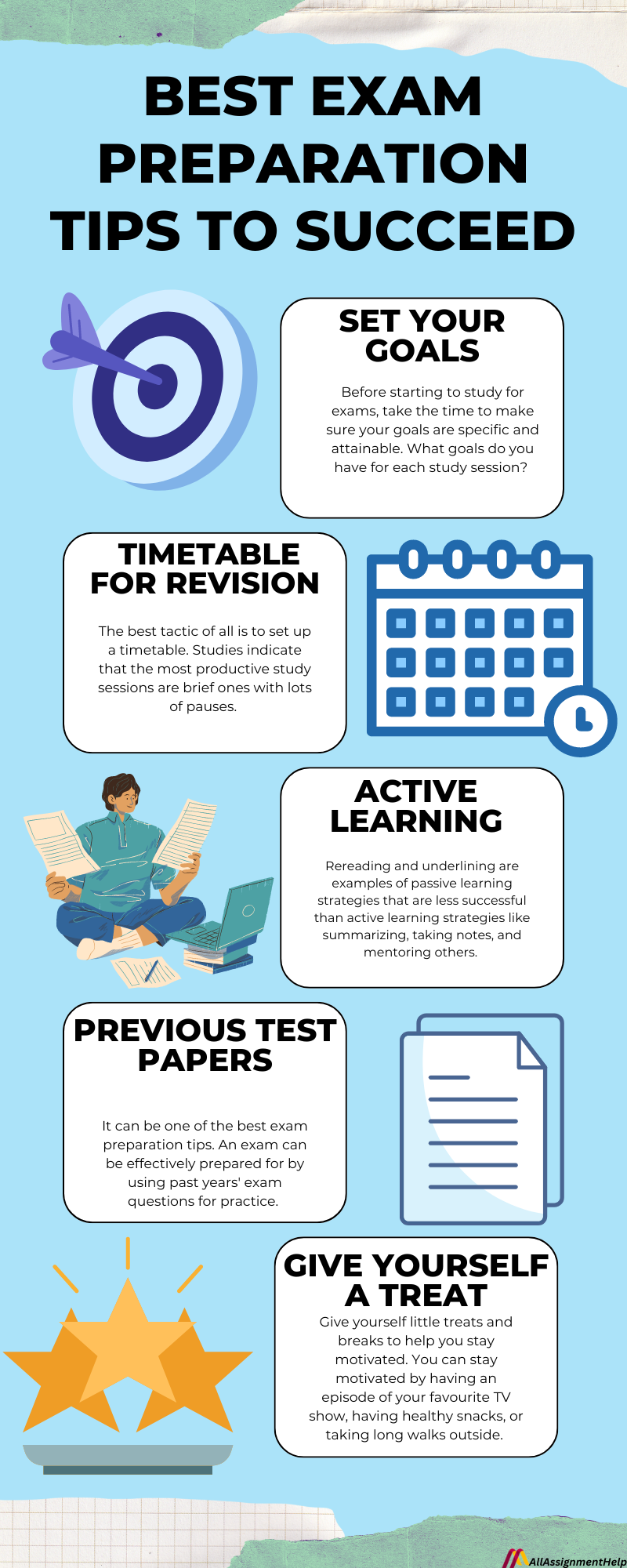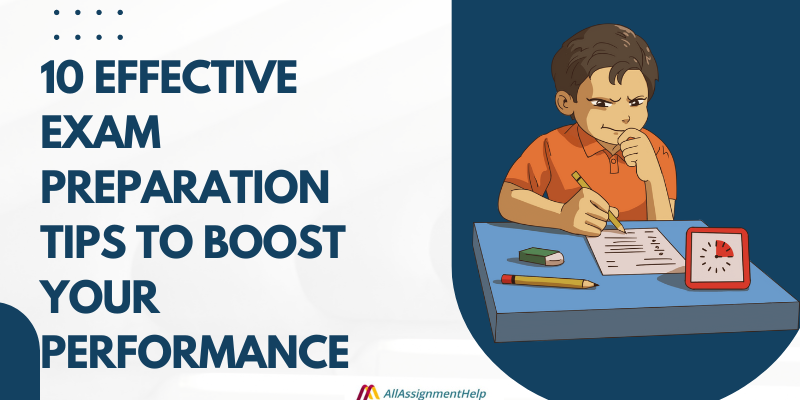Table of Contents
It might be not easy to study effectively for an examination, especially when you have a busy schedule. To ensure success, it is essential to develop productive study habits. There are various actions you can take to make sure you are fully prepared and ready to perform at your best, whether you are preparing for secondary school exams, A-Levels, university finals, or any other kind of examination.
Exams are an unavoidable aspect of schooling. Although they might be stressful, with the right planning, they may also offer chances for success. It’s essential to learn the method of studying and how to prepare for exams. This detailed blog of allassignmenthelp, will assist you in understanding How to prepare for exams.
10 Best Exam Preparation Tips To Succeed
One of the most difficult parts of college is taking final examinations. Before the finals, there is a tonne of information to retain, stay organized, and absorb. You can improve your grade point average (GPA) and lessen stress with the effective suggestions below.

1. Set Your Goals
Before starting to study for exams, take the time to make sure your goals are specific and attainable. What goals do you have for each study session? Do you want to finish a series of practice problems, grasp a specific subject, or commit important facts to memory? Setting your goal clearly can help you stay motivated and focused.
For many students, achieving the goal may be challenging because they have multiple responsibilities at once. You need professional assistance if you are among those who manage a lot of tasks all at once as it prevents you from achieving your goals. These experts are so talented they can help you with your academics at any level. Even many students get online class help from them. With their help, they can finish their classes on time. So whether it is your online coursework or exams, these experts are there for you.
2. Make a timetable for revision
The best tactic of all is to set up a timetable. Studies indicate that the most productive study sessions are brief ones with lots of pauses. To give oneself more variation, combine this with switching around the subject areas throughout the day. Also, make sure you have specific goals for each day, week, and month. This will help you monitor your progress and keep track of when the exam is scheduled.
Make a thorough revision plan that specifies the areas you must cover and when to stay organized and focused during your revision session. Having a clear plan in place will help. After you’ve accomplished that, divide your subjects into more manageable chunks and designate distinct time slots for each. Prioritize your weak points while making sure you’ve read through the entire content.
Read Also: Crafting Your Own Epigraphs: A Step-by-Step Guide
3. Use strategies for active learning
Rereading and underlining are examples of passive learning strategies that are less successful than active learning strategies like summarizing, taking notes, and mentoring others. Engaging with the content actively increases your chances of retaining and understanding it. To help with important concept retention, think about utilizing mind maps or flashcards.
4. Exam practice with previous test papers
It can be one of the best exam preparation tips. An exam can be effectively prepared for by using past years’ exam questions for practice. It will not only facilitate your familiarization with the format of the exam but also assist you in pinpointing any areas in which you still need to concentrate your study efforts. Find old exam papers online and try to respond to the questions as if you are taking the test. Set a time limit and mark yourself honestly; they’re really helpful when the examinations draw closer because they provide exam practice. This can assist you in assessing the exam’s time and level of pressure.
5. Check Your Memory Skills
Consider using memory-boosting strategies like mnemonics, acronyms, visualization, and association to help you retain material better. These strategies can help you remember difficult ideas.
Along with this, you may also try out other revision strategies to see which ones suit you the most. After all, the more ways you interact with the content, the more likely it is that you will remember it when it comes time for the test.
6. Have Regular Breaks
To prevent burnout, consider regular breaks into your study plan. Studies have shown that taking brief breaks throughout study sessions enhances focus, productivity, and general well-being.
Make use of your break time to unwind, rejuvenate, and partake in stress-relieving activities. For last-minute exam preparation advice, keep in mind that a rested mind is a sharper mind.
Read Also: Latest Radiography Dissertation Topics Ideas for Your Next Dissertation
7. Make a stress management investment
Exam preparation can be stressful, therefore it’s important to learn efficient stress management techniques. Here are some pointers for reducing stress:
- Engage in regular exercise: Exercise regularly can help you feel happier and less stressed.
- Use relaxation techniques: Yoga, deep breathing, and meditation can all help you unwind and lessen worry.
- Speak with someone: Sharing your worries with someone else might give you perspective and a sense of support.
- Get enough sleep: Sleep is essential for lowering stress levels and preserving general health.
- Get expert help: Avoid overstressing yourself since your mental well-being comes first. If You cannot handle your online exams due to any reason then you are free to get online exam help from an expert. Yes! Even you can ask them to take your online exam for you. All you need to do is share your exam details with them and pass with flying high colours.
8. Recognize your preferred method of learning
You can adapt your studies to fit your requirements and preferences by being aware of your learning style. While auditory learners prefer to listen to lectures or audio recordings, visual learners gain from diagrams or films. So whatever style suits you, adopt that.
9. Educate others on the subject at hand
It is a good way to identify knowledge gaps, strengthen comprehension, and solidify knowledge when you teach it to others. Finding and emphasizing the essential topics is an essential first step in teaching. Make complex concepts easier to learn by utilizing visual aids, mnemonics, and analogies. To recognize and resolve misunderstandings or uncertainty, teaching involves persistence, repetition, and active listening techniques.
Furthermore, developing communication skills and boosting confidence can be achieved through practising teaching others.
10. Give Yourself a Treat
Building good habits requires consistency, time, and work! Give yourself little treats and breaks to help you stay motivated. You can stay motivated by having an episode of your favourite TV show, having healthy snacks, or taking long walks outside. It’s also important to pay attention to your feelings and moods and concentrate on thinking positively.
Exam-day anxiety can be overcome by preparing well and using some helpful exam preparation strategies. Exam day performance can help you maximize your learning experience.
Just keep in mind that you can conquer any academic obstacle and achieve new heights of success if you are determined and persistent. Remember to be positive and focused while having faith in your abilities.
And most important thing is seeking support from a trusted person, like a friend, teacher, family member, or an online expert is crucial when experiencing stress. Asking for help shouldn’t be seen as embarrassing because many people struggle with tests. You can conquer the fear of exams if you follow the above exam preparation tips religiously.
How To Be Prepare On Exam Day?
Exam fear may generate excessive stress for some students. Because they are under a lot of pressure, they sometimes forget what they have learned. They lose their minds when taking tests. Firstly, don’t panic and maintain your composure. Also, follow the advice below:
- Get ready: Eat a healthy meal to start the day, and allow plenty of time to go to the exam room. Don’t forget to bring all the necessary supplies, such as pens, pencils, and a calculator. You can carry a water bottle too.
- Do some Breathing exercises: If you’re feeling stressed out, try doing some breathing exercises. Inhale for four counts via your nose, hold your breath for two counts and exhale for seven counts. You can feel more at ease if you repeat this.
- Read Question Paper Carefully: Spend a few minutes reading the questions and directions. You will then be fully aware of what is expected of you. If you have any questions, ask an exam supervisor; they are available to assist you.
- Plan Out: Estimate the amount of time you will need for each question. Try not to freak out if you get stuck on a question, but give yourself enough time to go back to it at the end.
- Forget about the exam once it’s over: Once the exam is over, put it out of your mind. Avoid comparing your answers with those of your peers or spending too much time reviewing them in your brain. Just concentrate on the upcoming test.
The use of organization, planning, and active learning is necessary for effective exam preparation. You can approach your tests with confidence if you set clear objectives, make an organized study timetable, and use efficient study methods. Always remember to evaluate your progress, keep a positive mentality, and take care of your physical and mental health. You’ll be well-prepared to meet your academic objectives and perform well on exams if you use these exam preparation tips.
Read Also: Tips to Craft A Problem Solution Essay
FAQs
| Q. When should I begin studying for a test? A. Exam preparation should ideally begin four to six weeks in advance, depending on the exam’s level of difficulty and the volume of content to be covered. Beginning early lessens stress and prevents last-minute cramming. |
| Q. What study methods can enhance one’s success in exams? A. Active recall, spaced repetition, mind mapping, summarizing notes, and imparting the content to someone else are all useful study strategies |
| Q. How can I properly manage my time while preparing for an exam? Among the best time management strategies are to prioritize challenging courses first, divide up study periods into manageable portions, and schedule regular breaks to prevent burnout. |
| Q. How can I properly manage my time while preparing for an exam? Among the best time management strategies are to prioritize challenging courses first, divide study periods into manageable portions, and schedule regular breaks to prevent burnout. |
| Q. How can I concentrate and remain composed throughout the exam? To remain composed, pace yourself, breathe deeply, and maintain a positive attitude. Take a moment to relax, close your eyes, and take deep breaths to help you focus if you’re feeling nervous. |
